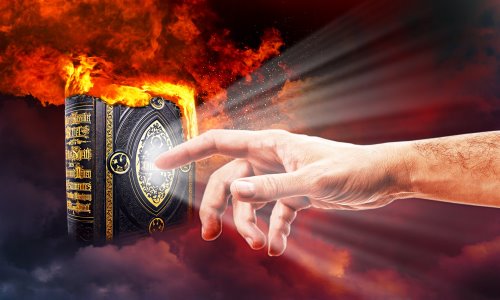
Ecclesiastes 9:5
For the living know that they shall die: but the dead know not any thing,
neither have they any more a reward; for the memory of them is forgotten.
Many of our readers do not have access to any libraries of great size. You might be interested in what some of the earlier writers believed. Such a study will show the beginnings and spread of apostasy and the creeping of heathen philosophies into the churches.
In "The Duration and Nature of Future Punishment" by Henry Constable (1868), we find a list of early writers and their views on this subject. The death date of each is given.
Barnabas (AD 90), Clement of Rome (AD 100), Hermas (AD 104), Ignatius (AD 107), Polycarp (AD 147), Justin (AD 164), and Theophilus of Antioch (AD 183); all held to the Scriptural view that the supreme penalty for all who did not have life was eternal death.
Then came a couple of minor writers:
Athenagoras (AD 190) and Tatian (AD 200) were steeped in the Greek philosophies of Plato and Aristotle. The Greeks got their ideas from Babylon. So these two advanced the idea of the immortality of the soul ("Thou shalt not surely die," the lie of Satan). Their writings were not taken too seriously, and they were considered more or less heretics.
Two more writers, true to the Word, came in about this place. They were Irenaeus (AD 202) and Clement Alexandrinus AD (212).
Then, the Greek influence was again felt. Tertullian (AD 235) not only came out with the theory of the immortality of the soul, but he also taught the eternal conscious torment of the lost. This idea came especially from the Greek myths, which they themselves did not believe. They were simply stories to entertain. Hippolytus (AD 240) followed with the same ideas.
This was so revolting to Origen (AD 253) that he invented the idea of universal restoration because he accepted the theory of the immortality of the soul. Something had to be done with the soul. Since man had become as God, (another lie of Satan), had immortality, and could not die, even though God not having the power to destroy him, there was a question of what to do with man.
Arnobius (AD 303) still held to the teaching of the Scriptures. He was about the last of those who had The Truth—then followed Augustine (AD 430). He fastened both false teachings, the immortality of the soul and the eternal conscious torment of the wicked, onto the church, and it has stuck till now. It is so strongly embedded that no reformation can eradicate it.
Now you can begin to see why there is so little said today about the Resurrection. An immortal soul does not need it. Why bother with a body? And not only is the deity of Christ denied, but His work as well. How few today believe that He died for sinners, for the ungodly! And even sin itself is denied. What a mess! "Thou shalt surely die."
The dream of men in the past ages was that there might be some way to obtain immortality. Some philosophers dreamed that man had an immortal soul. But they did not know God, nor His Word.
Only One has had immortality so far. That is The Lord Jesus Christ (1 Timothy 6:16). He had a near competitor in the person of Achilles (A mythological Greek character). Christ is The King, eternal, immortal, invisible, the only God (1 Timothy 1:17).
That which is immortal cannot die. It is not subject to death. It is man's desire. Can mortal man obtain it? Do the Scriptures hold out any hope that man could ever become immortal? Yes.
But this obtaining of immortality is only on God's terms, not by any philosophies of the heathen or the creeds of the churches. It is only reasonable that one must partake in the divine nature in order to have a Resurrection and immortality. See 2 Peter 1:4.
The idea that Achilles should be mortal in his heel shows the foolishness of the heathen mind. True immortality has been brought to light only by The Gospel. It is incorruption. See 2 Timothy 1:10.
The traditions of men and their religious institutions tell us that immortality is put on at death. But that is contrary to Scripture. There we are told that the dead shall be raised incorruptible. Then is when this mortality puts on immortality, and this corruption puts on incorruption, and not sometime before. Read 1 Corinthians 15:52-54. (Although this is for a past Dispensation, Resurrection is not a Dispensational Blessing, but The Hope of every believer of all time). Members of The Dispensation of The Mystery will have this experience on The Day of Redemption (Resurrection). See Ephesians 1:14; Eph. 4:30.
But some may insist and ask if there is a chance that any might obtain this great gift without death and resurrection. Yes, it is possible, and many will have this experience on that day. We are told that when the Lord comes, those believers who are living shall never die (John 11:26).
But those who never die must have a change. They are no longer mortal. And so it is (1 Corinthians 15:52). At the last trumpet, and in the twinkling of an eye, both the dead and the living put on immortality.
No man has the seed of immortality in him till he has been begotten from above, or again (1 Peter 1:3, 1Pet. 1:23, and notes in margin of Companion Bible). That is why the Resurrection (being born again) depends on a begetting or obtaining of everlasting life (John 3:16). Those who do not believe the Son will never see life and, therefore, never have immortality (John 3:36).
At death, do some go one way and some another? All go unto one place; all are of the dust, and all turn to dust again (Ecclesiastes 3:20).
Does knowledge cease at death? The dead know not anything (Ecclesiastes 9:5).
Is dust the only name for the condition of the dead? All go to the same place, and it is named. There is no work, nor device, nor knowledge, nor wisdom, in the grave, whither thou goest (Ecc. 9:10).
What other names are given to the grave? In Hebrew, it is Sheol, and in Greek, it is Hades. It can be translated as either hell or grave. Sometimes, it is the pit. See Appendices 35 and 131 in the Companion Bible.
Are there other words translated as hell in the Bible? Yes, there appears the word (gehenna several times. For instance, it occurs first in Matthew 5:22 and is in connection with fire. It is nothing more than the city dump where all refuse, dead animals, and dead criminals were disposed of. The worms and the fire did their work there. Notice in Isaiah 66:24 that these are spoken of as carcasses, that is, dead bodies. They, therefore, are not conscious of the fire and the worms, superstitions notwithstanding.
Are there any exceptions of any dead not going to the grave? Not a single exception. Even our Lord went there when He died.
Have any escaped out of that place? Yes, just one instance. In Acts 2:31, Peter quotes Psalms 16:10, "His soul was not left in hell, neither His flesh did see corruption." This had to be done to fulfill the promise in Psalm 132:11 of Christ sitting on the throne of David. See Psa. 2:6 also.
But do not some folks go to heaven when they die? Never! Not even our Lord went to heaven when He died, not till 40 days later. And no man hath ascended up to heaven, but He that came down from heaven, even the Son of man Which is in heaven (John 3:13).
Are there other passages on this theme? There certainly are. But now is Christ risen from the dead, and become the firstfruits of them that slept (1 Corinthians 15:20). Who is the beginning (of the new creation), the Firstborn from the dead (Colossians 1:18). The Firstborn of every creature (creation) (Colossians 1:15).
What is this new creation? It is made up of all who have life and resurrection. Christ is the beginning of this creation. These things saith the Amen, the faithful and true Witness, the beginning of the creation of God (Revelation 3:14). Christ is the beginning of the new creation, the saints that arise from the dead.
What is death like? For the believer, it is like sleep. See 1 Corinthians 15:20.
Then, there is an escape from hell or the grave? Yes, by Resurrection only. See Matthew 16:18.
In the A.V., you will find the word immortal used once and immortality five times, all in the NT.
For further study of the terms, look up incorruption and incorruptible. Also, this will help to define what immortal and mortal mean. That which is mortal is not abiding but subject to corruption. That is simply a return to the dust from which it is made. This is the biblical use of the terms.
The risen Christ is spoken of as the King eternal, immortal, invisible, the only God, in 1 Timothy 1:17. He was raised in a Glorified Immortal Body and is the Firstfruits of them that slept, the Firstborn from among the dead. This points to a future harvest.
Just recently, a man said that he was sure that he had immortality. Blasphemy! The appearing of our Lord Jesus Christ: Which in His times He shall shew, who is the blessed and only Potentate, the King of kings, and Lord of lords; Who only hath immortality, dwelling in the light which no man can approach unto; which no man hath seen, nor can see (1 Timothy 6:16). According to this man's claim, he must be Christ!
The expression "immortal soul" is very common among the heathen and the philosophers, but there is no such expression in the Word of God. Immortal, nor any of its synonyms, ever appear in connection with such expressions as soul, spirit, etc.
In Romans 2:7, we are told that those who seek immortality (they do not have it now) will receive a reward, eternal life, in The Kingdom. Of course, this is in a past Dispensation, but it gives us a basic fact.
Immortality is first spoken of in Genesis 3:4; "Ye shall not surely die." This can be quoted out of context and used to prove that man is immortal. But it was Satan who said those words to Eve, and they are the lie. It is commonly thought that life and immortality were here brought to light by Satan and later confirmed by Plato. And we find this written into the creeds of Christendom. But God has said, Our Saviour Jesus Christ...brought life and immortality to light through The Gospel (2 Timothy 1:10). Just whom are we to believe, Satan or God?
Immortality is something to be sought after, to be hoped for (Romans 2:7). It does not become our possession till The Resurrection. In a past Dispensation, we find the words, "...the dead shall be raised incorruptible...for this corruption must put on incorruption, and this mortal must put on immortality" (1Corintians 15:52-53).
Immortality, therefore, is conditional. It is not for all, but only for those who have life. We must remember that Resurrection is the answer to death, the only escape from the grave or hell. Its gates are not strong enough for that, for when the Lord calls, all those that are His will come forth.
Since resurrection is the key to immortality and incorruption, it should be sought with all diligence. It is a birth that follows a begetting.
1 Corinthians 1:18 For the preaching of the cross is to them that perish foolishness. Note that perish is in the present tense, and so it could read, are perishing. This immediately presents a problem. Orthodoxy teaches that there is no perishing in this life but in a life to come. So here is a contradiction.
John 3:16 also uses the present tense and tells us that those who believe have everlasting life here and now, and those who do not have this life are perishing. This is again set forth in 1 John 5:12. Those who have the Son have life here and now, and those who do not have the Son do not have life. If they do not have life, are they then in the category of the perishing?
Read 1 Corinthians 15:12-19 carefully. An un-risen Christ is the same as no Christ at all. This we can believe. If Christ has not risen, faith is vain (empty). We would yet be in our sins. But the argument in Romans 4:25 is that Christ was raised because of our being justified, that is, sins taken away. He was delivered to death for our offenses. But if He is not raised, then these offenses are not removed; we are yet in our sins.
John 8:51 "If a man keep My saying, he shall never see death." The meaning of this verse has been lost somewhat in the translation. In the Interlinear (Stephens Text), it reads, "If anyone My word keep, death in no wise shall he see forever."
But this is still hazy. If we were to paraphrase it in modern English or make a version of it, it would read, "If anyone keeps My word, he shall not stay dead forever." See note on this verse in Companion Bible, page 1539.
This is equivalent to saying that the believer shall not perish. The word perish is defined for us in 1 Corinthians 15:18.
So we see that John 8:51 and John 3:16 have a great deal in common, that they mean the same thing in the long run. In John 3:16, the believer shall not perish but shall have everlasting life (which makes possible The Resurrection that follows it).
We have four expressions in John 6 that express the same sentiment and tell what comes from everlasting life:
1. And this is the Father's will which hath sent Me, that of all which He hath given me I should lose nothing but should raise it up again at the last day (John 6:39).
2. And this is the will of Him that sent me, that every one which seeth the Son, and believeth on Him, may have everlasting life: and I will raise him up at the last day (John 6:40).
3. No man can come to me, except the Father which hath sent me draw him: and I will raise him up at the last day (John 6:44).
4. Whoso eateth my flesh, and drinketh my blood, hath eternal life; and I will raise him up at the last day (John 6:54).
In Ephesians 1:19, it is plainly stated that Resurrection power is to us-ward who believe. We can be assured that this great power that raised our Lord from the dead and which works in the believer now will one day raise us up to life everlasting.




























